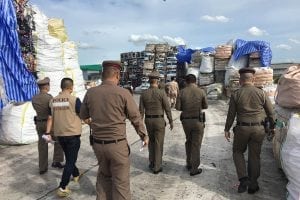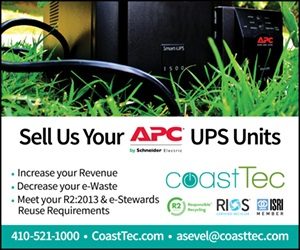
Pathum Thani/Thailand- June 8, 2018: The Royal Thai Police investigating an e-scrap facility in Thailand.
The owner of a Thai e-scrap facility that was visited by police last month denies illegal activities were occurring at the location.
Yuet Kwai Lau, who goes by Irene, defended her company’s Thailand operation, Wai Mei Dat (WMD) Thai Recycling, in a statement sent to E-Scrap News. Police entered the sprawling facility on May 22, eliciting coverage from major media outlets.
“There has been numerous misleading, and false reports regarding the inspection of the Wai Mei Dat facility in Thailand on May 22nd,” according to the statement. “Wai Mei Dat adamantly refutes the claims that any illegal, non-compliant, or immoral business practices were conducted there, or at any of our facilities. Wai Mei Dat follows all the regulations in place, and [has] all permits and licenses required to conduct business in Thailand. The claims made that arrests were made, and employees being illegally in the country is false.”
The statement adds WMD is cooperating with the Thai government to ensure its business practices are compliant with government law and recycling procedures.
‘Inspection’ or ‘raid’?
Headquartered in Hong Kong, WMD also has an R2-certified location in Chino, Calif., near Los Angeles. That facility opened about a year and a half ago.
In an interview with E-Scrap News, William Moss, WMD’s director of business development in Chino, said he’s fielding calls from customers who are concerned about what happened in Thailand. They’re asking him whether the Chino location exports material there.
Moss told E-Scrap News the Chino facility sends all its e-scrap to domestic downstreams, naming companies on the East Coast and Southwest.
“I wouldn’t even know how to get it to Thailand from WMD, just because that’s not how we operate,” he said.
English-language media outlet The Nation, describing the May 22 action as a “raid,” said police found improper e-scrap management and disposal, as well as undocumented workers. Another major English-language paper, the Bangkok Post, listed WMD among five plants where police launched a “massive crackdown” to “stamp out pollution.”
Moss said he hasn’t traveled to the Thailand facility, but from conversations with owner Yuet Kwai Lau and staff members in Thailand, and from the bills of lading he’s seen, he has no reason to believe anything shady was going on there. He noted Yuet Kwai Lau relies on a local staffing company, which is responsible for collecting proper worker documentation.
“If I was a betting man and I had to, I know there was nothing that was done wrong,” Moss said.
The police action was described to him as an “inspection,” not a “raid,” he said. Moss said he has yet to see specific accusations or proof or wrongdoing.
“[The company’s leaders] don’t even know where to begin to disprove it, because it’s such a broad, general accusation,” Moss said.
His understanding is the police actions relate more to political turmoil in Thailand than any kind of regulatory or compliance problem, he said.
Since the interview, Thailand announced a ban on imports of e-scrap and recovered plastics (see related story).
Photo credit: Sirapob Horien/Shutterstock
More stories about Asia
- BAN report links brokers to surge in US e-scrap exports
- Processor responds to e-Stewards eligibility suspension
- Bill would create critical minerals task force



